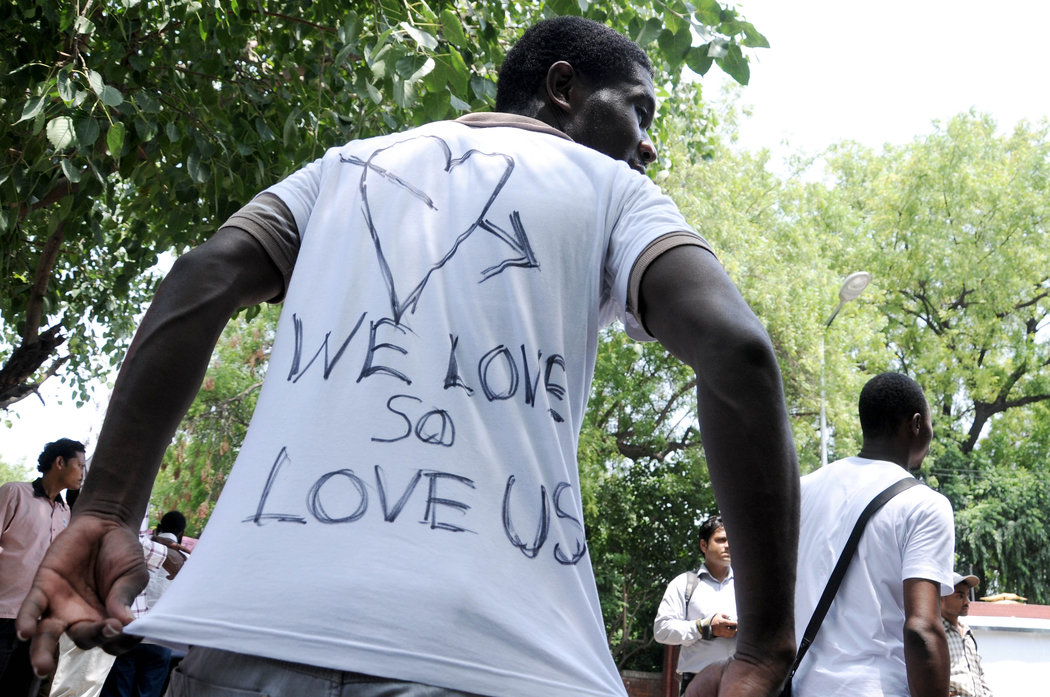African National Beaten To Death In New Delhi

NEW DELHI: This weekend, a Congolese national was brutally beaten to death in Delhi’s Vasant Kunj neighbourhood. According to accounts, racial slurs was thrown about as a group of men chased MT Olivia -- who taught foreign languages as at a private institute in New Delhi -- pelting him with stones and thrashing him. Olivia was rescued by another group of people, who rushed him to hospital where he succumbed to his injuries.
Although details are still sketchy -- as a case of murder has been registered, the attack reeks of racism when seen in the context of India’s troubled trajectory. Earlier this year, the racist face of India made headlines when a Tanzanian student was stripped and beaten following a road accident in Bengaluru in February. The 21 year old Tanzanian student was assaulted and partially stripped by a mob in Bangalore, after a Sudanese student's car ran over and killed a local woman. The crowd chased the young woman and "removed her top," and her three friends -- also Tanzanians -- were harassed as well.
Or take the incident in Delhi a couple of years ago, when three African students were attacked by a mob in New Delhi’s Rajiv Chowk Metro Station. A video posted to YouTube shows the three students being beaten with belts, shoes, rods and glass, with the police making a half-hearted attempt to intervene.
The Indian government condemned the attack, albeit four days after it happened, and assured the envoys of Gabon and Burkina Faso that the police were investigating the attack. The government said that it has “zero tolerance for racism.”
This so-called “zero tolerance for racism” isn’t entirely believable, as African officials expressed their deep concern about this discrimination against their nationals in India, and the largely ambivalent attitude of Indian political parties towards the violence. When New Delhi hosted the Indo-African summit, The Citizen spoke to several officials about India’s reputation as a particularly racist country. A senior Ambassador here pointed towards this, maintaining that even more than business and trade it was essential for the Indians to be made more conversant with the African countries, their culture and their people “to at least try and end this obvious prejudice and discrimination.” This official was more polite than others who told this reporter on the sidelines of the summit that they were shocked to see how racist India was becoming.
The political apathy is of deep concern to the African governments and their people with dark skinned persons now not willing to visit India. African students in Delhi and other parts of the country are on record now expressing fear for their safety. Many told reporters from The Citizen that their friends are no longer seeking admission in Indian universities, even as they said that they are seriously thinking of leaving altogether. A young woman who is studying here in Delhi University was categorical, “my family wants me to come back, but I still have a year to go for my degree, I just do not know what to do.”
The attack on Olivia is indicative of the fact that these concerns are real.
Sources said that the African envoys have raised this issue informally at different levels, looking for ‘solutions’ but finding none. African nationals studying or working in India have repeatedly pointed towards the constant threat to their security, with people harassing them on the streets, shouting comments, and making fun of their colour. “We are lucky if it stops at this,” a student confided.
At the airports the African visitors are detained, and usually subjected to an extra frisk and search. “We are lumped together in this stereotype that all Africans are peddling drugs, or sex,” the students point out. No one in India is willing to make a distinction.
A student who is leaving for his country added, “Indians seem to be more racist than the white western countries.”
And though he did not add, there is a clear obsession here with the fair and the white. The ‘fair and lovely’ creams play on this phobia against the dark skin, with marital advertisements all promising ‘fair and beautiful’ girls as prospective brides.
Even tourist friendly Goa turned completely racist in 2013 with a popular beach putting up signs reading “Say No to Nigerians, Say No to Drugs.” The placards compared the Africans to cancer and wild animals while the authorities looked on.In 2014, the newly elected Aam Aadmi legislator Somnath Bharti led a vigilante mob to abuse and beat up Nigerian women in Delhi. Why? They were running a drug and sex racket, said he. And how had he come to that conclusion? That is what the residents of the colony where they lived maintained was the response.
The incidents against African students fill a volume. In all cases the action has been niggardly and the political response pathetic. In all these cases, little action has been taken to bring perpetrators of violence to justice, all whilst New Delhi quips that it has a “zero tolerance policy” when it comes to racism.
Comments on social media regarding the attack on Olivia highlighted this obvious discrepancy.
(Photo: African students demonstrated against discrimination at a protest in New Delhi. Credit Deepak Malik/Demotix)



